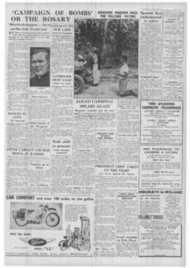Page 4, 9th February 1951
Page 4

Report an error
Noticed an error on this page?If you've noticed an error in this article please click here to report it.
Tags
Share
Related articles
Different Opinions On Tito
Captain Waugh's Unpublished Scoop Concerning Tito
Dictator Says Honour For Archbishop Stepinac Is 'an...
Tito Turns On The Heat
Press For Release Of Archbishop Stepinac
Relations with Tito
SHOULD CATHOLICS
MAKE FRIENDS WITH YUGOSLAVIA?
By Michael de la Bedoyere
I ii, T is regrettable and shame
ful to see the manner in
which the Government is encouraging Yugoslavia to join our cause."
This is an editorialjudgment in the current number of one of our diocesan magazines. We imagine that it will meet with the approval of the majority of Catholics in this country. .
They remember — and rightly remember—the unjust manner in which Archbishop Stepinac has been treated, as well as the continued persecution of the Church under Tito. Communist Yugoslavia indeed set the precedent for religious persecution and the trial of a great Churchman, so far as non-Russian Europe is concerned.
Moreover, no one attempts to maintain that the dictatorial Communist police ride of Tito has been essentially changed since the domestic quarrel with Stalin, To woo Tito today is patently rather like asking the devil to help us drive out the devil.
A devil?
ITT we believe that we should pause before making up our minds about this question.
To begin with, the devil analogy is a dangerous one, Only the Devil is a devil. Tito and his henchmen (just like Stalin and his Politburo)
are not devils, They are human beings, like ourselves, whom God came into the world to save.
We have to ask ourselves whether this end will be best served by seeking to improve relations with them or by putting them outside the pale.
There are conditions when it is impossible to improve relations with one's opponent without betraying the principles for which one stands. At present, this is manifestly the case so far as Moscow is concerned. Is it also the case with Yugoslavia?
It seenis to us to depend very much on the attitude one takes.
It is probably true that our Government is only very remotely interested in the fate of Arch
bishop Stepinac and the Christians in Yugoslavia, but even our Government at the present time is probably not wholly disinterested in the nature of the internal rule in Yugoslavia. If for no other reason than the hope of some security in any understanding with Yugoslavia, it must wish to see some degree of liberalising and civilising of the Tito tyranny.
There is all the difference in the world between a cynical appeasement of a tyrant for purely utilitarian purposes and taking advantage of circumstances to improve relations with such a tyrant, while insisting throughout on one's total disapproval of much of his behaviour and allowing no chance to pass of persuading him to reform his ways.
One recalls, too, the case of Communist Russia during the war. Despite Russia's potential power, few, if any, Catholics questioned the need to fight with her, and only a very small minority protested at the time against full alliance and extravagant manifestation of friendship. Yugoslavia today is far less dangerous. She has challenged Moscow. And the need for an understanding is hardly less.
Analogy with Spain
THE position of Franco's Spain has some analogy with the position of Tito.
It is true that for many Catholics there is nothing seriously wrong with the Spanish internal regime. We maintain that though it is a regime eminently unfitted for Anglo-Saxon countries, it is not unsuited to the Spaniards, and that it is at least based on a recognition of religious rights which are in fact the heart of real human liberty.
That is what we feel. But the opponents of Franco feel very differently.
Yet we have maintained that the diplomatic boycotting of Spain was a very foolish thing, even for the opponents of Franco. We have argued that by far the best chance of a gradual liberalisation of the internal Spanish regime lay in studying how to improve our relations with him, not in hurling diplomatic insults at him.
This is commonsense, as well as
good Christianity. But if it is true for Franco, it is relevant also to the case of Tito. No one ever suggested that the opponents of Franco who foolishly boycotted him should include in their reversal of policy any change in I their condemnation on principle of the Franco rule.
Key spoil
jr it is possible to improve rela
tions with Tito's Yugoslavia, and yet continue to condemn the nature of the Tito rule—indeed to seek to take advantage of such improved relations to persuade Tito to liberalise his regime—then it is certainly clear that there is absolutely everything to be said for such a policy, rather than its opposite.
Our enemy is certainly Communism which still flourishes in Yugoslavia, but at the moment the dangerous spear-head of Communism is not Belgrade; it is Moscow, which is dictating aggression to nearly a third of the world's surface.
One of the potential key spots of that Communist aggression is Y ugoslavia.
A glance at the map will show that Yugoslavia dominates the eentral Mediterranean and central Europe. The occupation of Yugoslavia by Russia or Russian satellites would immediately threaten Italy (and the Vatican State), and such a threat to Italy would go far to weaken and soften the attitude of France, the mir.d of whose people seems as yet far from finally made up about the right future course of policy.
Moscow's chance
yUCiOSLAV1A is reasonably
well armed, and in so far it is a relatively " hard " spot on the edge of the Soviet empire. But it is not suggested that Yugoslavia unaided could resist Russia for very long. Moreover, from Russia's point of view, it would be very easy to find excuses for an attack.
The present relations between Moscoiv and Yugoslavia are as bad as they can be, and these bad relations do not spring from the long-term conflict between the free world and Communism, but from an internal quarrel between thieves. If Russia decided to attack Yugoslavia, the Western world would find it very difficult to invoke the whole array of moral arguments which led to the wholesale condemnation of aggression in Korea.
This fact is more than likely to cause Moscow to pick on Yugoslavia for its next major adventure in aggression, if it decides that further aggression will suit its aims.
And the Western world's difficulty in reconciling two opposite views about Yugoslavia and finding a suitable formula for immediate resistance to Moscow's aggression in Yugoslavia will not for a moment alter the fact that once Moscow's rule is established
in Belgrade, the whole defensive position of the West will be radically altered for the worse.
Our decision
INDEED, the position is so
serious that it seems essential for the Western Powers to make up their minds immediately as to how they would respond to an attack on Tito by Moscow's orders.
There is a great deal to be said for the view that the best—and probably in the end the only— chance of preventing Moscow from attacking Yugoslavia lies in a firm warning from the Western world that such an attack would be considered aggression, and consequently that it would be immediately resisted.
If this analysis is correct, then we shall not be helping ourselves in our major purpose of holding Communist aggression at hay if we express ourselves in the words quoted at the beginning of this article.
Is it morally necessary that we should ? We do not think so. On the contrary, we think that there is a far better chance of a lifting of religious persecution in Yugoslavia and a release of Archbishop Stepinac, if there is a growth in understanding between Tito and the West.
While encouraging our Government and the Government of the United States to improve these relations, we must also insist that they continuously remind Tito of their utter disapproval of most aspe-cts ef his internal rule, and not least his treatment of religion which is clean contrary to the Four Freedoms. If Tito's resistance to Moscow is very valuable to us, our support of Tito is a matter of life and death to him. We must take advantage of this and not make fools of ourselves as we did with Russia.
We are not without very strong bargaining power to persuade him to mend the worst of his ways and to approach nearer to the civilised ideal which fate is calling upon him to defend.
blog comments powered by Disqus









